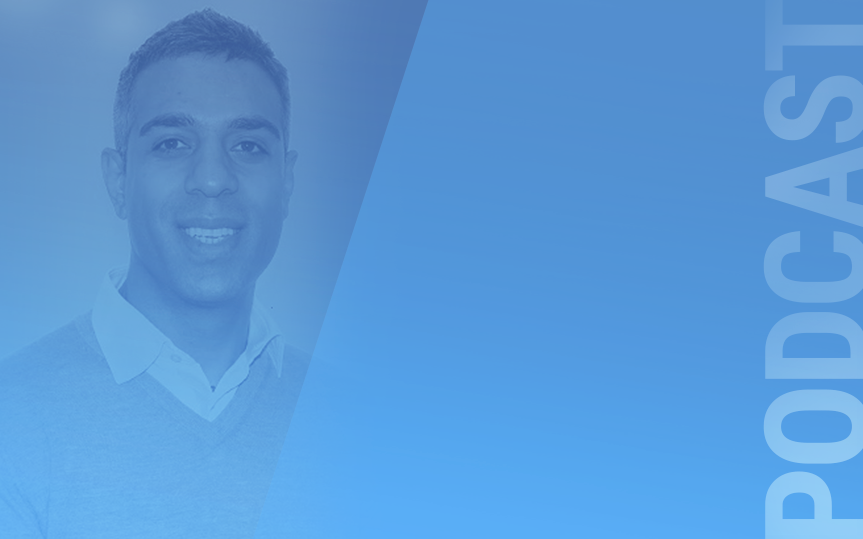Helping Founders Establish The Right Sales Infrastructure For Growth

With over 20 years of experience in sales and a background in neuroscience, Moeed Amin was frustrated by the current approach to sales and persuasion. He founded Proverbial Door to help businesses improve their outbound sales function for radical growth.
Moeed joined the Predictable Revenue podcast to discuss how founders can establish a sales infrastructure for profitable growth, from understanding your customers to hiring and managing an outbound sales team.
Moeed defines the sales infrastructure as “the setting in which salespeople perform”. “Think of it as the scaffolding,” Moeed says. “If you don’t have the right scaffolding, then you don’t have the right support for your salespeople to shine and deliver on their promises.”
What most founders are missing in sales development
When it comes to scaling revenue, there are several mistakes Moeed sees founders make over and over. The most common is hiring a chief revenue officer (CRO) without really understanding the sales process.
“Sales is still a very misunderstood profession,” Moeed says. Many founders come from a technical or subject matter background and haven’t yet invested the time in learning what the outbound sales process needs to look like for their company.
Oftentimes, founders will hire a CRO who has a great track record at other companies, but that person isn’t the best fit for their organization. The CRO needs to have experience in your industry, and either understand your buyer or be able to uncover that information.
This is why founders need to understand the sales development process. “They hire a chief revenue officer and ask them to grow the business, to grow sales, and then they leave them to it,” Moeed says.
But without understanding key sales metrics, the founder won’t know whether or not their CRO is making the right decisions; they’ll have no way to hold them accountable or measure their success.
Understanding the buyer is critical to outbound sales
Another common mistake Moeed sees with founders is they don’t know their buyers well enough. They can’t identify their ideal customer profile (ICP), and they have a very surface-level understanding of the buyer. If they have an ICP at all, it’s most likely focused on a company and not the human beings who are making the buying decision.
This is where the buyer’s journey comes into play. Successful sales development requires a clear understanding of the buyer’s motivations, where they go to educate themselves, and how they make decisions.
A mistake Moeed often sees is that after a cash injection, a founder will immediately jump to hiring more sales development reps. But without understanding the buyer’s needs, this only results in high customer acquisition costs and low retention rates.
“They’re not looking at growing their business,” Moeed says. “They’re just looking at making more sales at any cost, which is a hugely damaging approach.” Instead, founders should prioritize understanding their buyers before growing their outbound sales team.
How to win at outbound sales: become buyer-obsessed
According to Moeed, less than 1% of the companies he’s worked with over the years truly understand their customers. That’s a huge competitive advantage that’s sitting untapped. But for maximum growth, Moeed recommends going beyond surface-level company traits to understand your buyers on an individual level.
“Tell me about the Management by Objectives (MBOs) or KPIs of your typical buyer, how they are being measured, what will determine their bonus, and what their responsibilities are for their performance reviews,” Moeed says. These are the kind of metrics that are often overlooked in developing an ICP.
“If you don’t know how your buyers are measured in terms of bonuses, promotions, and things they care about–how could you possibly know what’s going to motivate them?”
“Understanding the world of your buyers is incredibly important,” Moeed says. Since your position in the market is unique, to stand out from the competition, “the way you touch the buyers and affect their world has to be different.”
That starts with a deeper understanding of your ideal customer. Everything has to be geared toward giving the buyer value, rather than your company’s ROI. “People buy from you because they trust you with their reputation.” And to earn that trust, you need to provide value.
Adopting a wider view of the buyer’s journey
According to Moeed, the buyer’s journey starts much sooner than most founders may believe. “Let’s say you’re thinking about eating at a restaurant; the buyer’s journey doesn’t start with you deciding to eat out today.” Instead, it starts with hearing about restaurants through friends, social media, or a culinary magazine.
At every stage in the process, someone is influencing the buyer. What your outbound sales team needs to do is earn a seat at that influencing table. That starts with understanding where the buyer is on their journey, what triggers can identify the different stages, and who commands the buyer’s attention at each stage.
Understanding the buyer’s journey will inform your outbound sales approach, marketing, and the skills and traits of the salespeople you hire.
Applying the buyer’s journey to your outbound sales process
Once your sales development team understands the buyer’s journey, they can adapt their approach based on what stage a prospect is in. Instead of always pushing for the sale, Moeed recommends asking, “What information is going to be valuable to them at this stage?”
If a sales development rep is trying to sell to someone who is still in the education stage, for instance–that person doesn’t want to be sold to yet. They’re still gathering information.
If the buyer is in the stakeholder validation phase, they need information they can present to the stakeholders in their company so they can have those internal discussions. What’s most helpful, then, is for your sales reps to provide that information without pressuring them to buy.
Who is responsible for mapping the buyer’s journey?
According to Moeed, everyone at the company should contribute to mapping the buyer’s journey, including the founder, sales development, marketing, consulting, customer success, and product teams. The more departments are involved, the more complete the picture will be.
However, ownership of the buyer’s journey belongs to the outbound sales and marketing teams. These departments should hold other parts of the business accountable to ask customers the right questions and analyze that information to craft a strategy.
Forming an outbound sales strategy
Once you have a deep understanding of the buyer and their journey, the next step is to form a targeted outbound sales strategy. Moeed recommends asking the following questions:
- What channels will you use to connect with buyers?
- Will your ICP respond better to sales development reps or more experienced salespeople?
- Do you need local salespeople who speak the language and understand the culture, or can you use a more centralized structure?
- Who are the people you need to hire, and what traits and skillsets fit best with your approach?
Many founders focus solely on skills when hiring. But Moeed emphasizes traits over skills because traits are more difficult to teach and equally as important. If you have a long, drawn-out sales process, for example, you’ll need patient salespeople. A hard and fast approach won’t work for your goals.
Incentives and compensation
Another aspect you need to consider is incentives. “Most people just go down the route of commission-based incentives,” Moeed says, “but what if your sales cycle is 8-12 months?” Monetary commission may not work as well in that case.
Instead, Moeed recommends focusing on the behaviors you want to encourage. Are those behaviors best rewarded by monetary or non-monetary incentives? If you’re trying to encourage initiative and continuous learning, then paid-for training programs may be a better fit. You can learn more about how to incentivize sales team behaviors here.
Hiring your first sales development leader
Similar to the process above, you’ll want to hire a sales development leader who fits your company’s approach. “You need to make sure you’re hiring a CRO who exemplifies and aligns with those values,” Moeed says, so they can encourage those behaviors in the entire outbound sales team.
Again, you’ll want to consider what behaviors need to be encouraged. If you want to emphasize learning through trial and error, then don’t hire a CRO who discourages people from making mistakes. Look for someone who promotes innovation. If coaching is important to you, find a CRO who shares that value.
At the same time, the goal of hiring a sales development leader is for them to improve upon what you’ve built. If you need help with your messaging, find someone who can help you develop it and win a seat at the buyer’s table of influence.
“You want a CRO who is going to challenge your view of things,” Moeed says. “The worst thing you can do is hire a CRO who is just going to be a ‘yes’ person.”
The first step for better outbound sales infrastructure
“Speak to your buyers,” Moeed says. Determine what you want to know and what the buyer’s journey could look like. Encourage others in your company to talk to customers, and give them a list of questions to ask.
Even more importantly, talk to those who didn’t buy from you and learn from that. “Finding out why [they didn’t buy] is in some ways more valuable than finding out from those who did buy,” Moeed says. Understanding the buyer’s journey is the first step towards a stronger sales foundation.
If you want to connect with Moeed to learn more about developing a sales infrastructure for growth, reach out via LinkedIn, Youtube or proverbialdoor.com.
And don’t forget to subscribe to our YouTube channel so you can be notified when our weekly podcast episodes are released and learn more about top sales development insights.
NO TIME TO READ?
Listen On:
Throughout 2021, we had the fortune of interviewing 50+ sales development experts on the Predictable Revenue Podcast.
These pages are packed full of insightful advice, actionable tips, and thought-provoking interviews with some of the world’s foremost sales experts.



